
Arctic Frontiers: Disinformation, Security and the Northern Sea Route
Bellona held a seminar on countering Russian disinformation in the Arctic at the Arctic Frontiers international conference in Norway
News
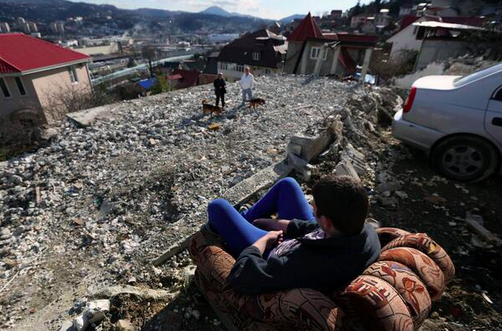
Publish date: February 7, 2014
News
SOCHI, Russia – The lighting of a torch can commemorate many things. Today, the Olympic torch will be lighted at Fisht Stadium in Sochi to mark the beginning of the 2014 Winter Olympics. Other flames are often lit to pay homage to the dead. I rather think that, even though the Olympic fire will be extinguished on February 24, that its light will eternally preside over an ecological grave.
Such perpetual pyrotechnics are a feature of Russian life. In dozens of cities, from Moscow to Vladivostok, such eternal flames burn in memory of those who fell, soldiers and civilians alike, during the Nazi invasion of Russia in World War II, in which one of every eight Russians died.
The Sochi Olympic flame, as it is sparked to light by a torch that has accidentally been extinguished 44 times during detours to the International Space Station, the North Pole and the bottom of Lake Baikal, will for many in Sochi and the North Caucasus’ Krasnodar Region serve as a reminder of a war waged against them, their environment, and their human rights.
Yesterday, as thousands of international reporters began to arrive in Sochi en masse, the twitter beast came alive with hilarity about the comical unpreparedness of Russia’s monument to its modern self to accommodate those who have come see it.
Those of you with twitter accounts can read the complaints of journalists, many of whom have never visited Russia before, on a dedicated twitter feed called @sochiproblems, where reporters jeer everything from the incomplete construction of hotels meant to house them, the admittedly odd installations of double toilets in public bathrooms that are not partitioned, to the filthy, sediment-filled bilge issuing forth from their hotel room water and shower taps.
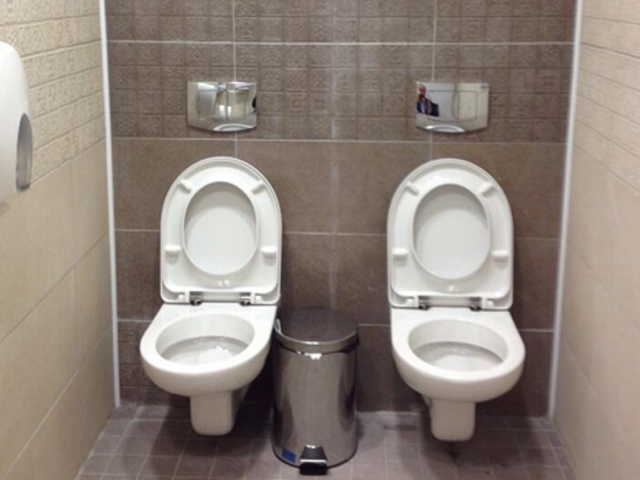
And, indeed, some of the posts are hilarious. One Canadian reporter tweeted that he had found a sign over a public toilet, awkwardly translated into English, forbidding visitors from fishing in the toilets. Seriously.
Obviously, plumbing problems are on a lot of people’s minds.
The Chicago Tribune’s reporter, Stacy St. Clair, famously tweeted yesterday that “My hotel has no water. If restored, the front desk says, ‘do not use on your face because it contains something very dangerous.’ #Sochi2014.”
The tweet, according to her newspaper, has garnered her 53,000 followers and turned her into a local press corps celebrity.
When her plumbing was restored, St. Clair wrote in her paper that the “water that poured through the faucet was dark yellow. It was the color of apple juice or a performance enhancing drug test specimen. The shower left what looked like fish food flakes coating the tub.”

She took the inconvenience with good humor when International Olympic Committee (IOC) chairman Thomas Bach issued a blanket apology to reporters for the lousy conditions some of them are enduring, tweeting that, “I just washed my face with Evian, like I’m a Kardashian or something,” in reference to the ubiquitous ultra-privileged sisters Kim and Kourtney of US tabloid infamy.
Wrong questions about water quality
It’s unfair to single out St. Clair – and Evian sales will doubtless skyrocket in Sochi, so she’s done a good turn for the local economy.
But her tweets are emblematic of one of the scarier realities about the coverage the Olympics are receiving: namely, why – after the Russian government has spent $51 billion on the most expensive Olympics ever – can’t you get anything but swamp water from a five-star hotel’s spigot?
It’s a question very few of the Olympic media – with remarkable exceptions like the Associated Press’s Natalya Vasilyeva and a handful of others like Andrew Kramer at the New York Times – seem to be asking, and instead chalk it up to stereotypes of Russia as a throwback of a country that has yet, more than 20 years on, to shed its ingrained Soviet incompetence.
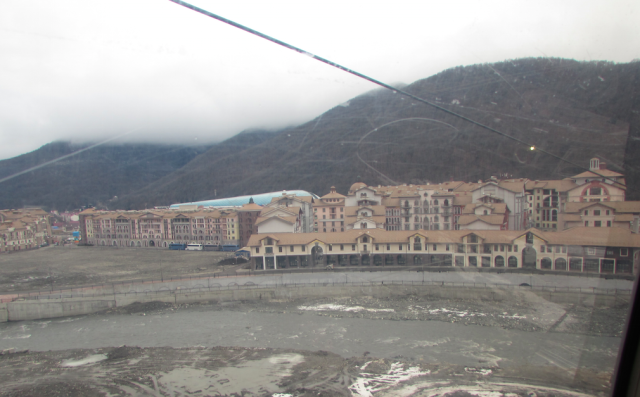
It’s not altogether wrong to say that President Vladimir Putin has exercised a huge degree of Soviet era muscle – and corruption – to cobble together his Olympic dreams. But just sloughing questions of toxic water off on easy answers like “this is Russia, what do you expect” misses the point of the environmental devastation that is being brought right to reporters in their hotel rooms.
Activists rush against authorities to release eco report
In a report that will be released Tuesday in Moscow, the Environmental Watch on the North Caucasus (in Russian), or EWNC, will recount in shocking detail just how things got to be as bad as they are – and most pressingly for Sochi reporters, how it is that the Mzymta River, Sochi’s main source of drinking water, has become so contaminated.
The International Olympic Committee (IOC) charter spells out a “Zero Waste” provision to countries hosting the Olympics, stipulating that no waste will be produced during the games. As IOC spokeswoman Emanuel Moreau has pointed out to me, however, that zero waste policy only applies to waste produced during the actual Olympics themselves – between today and February 23 – and that the IOC has nothing to do with the slag heaps and poisons produced before, and that will linger after.
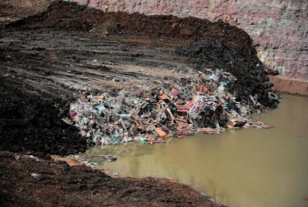
The Russian government early on picked up repeating the Zero Waste slogan, promising that the Sochi Olympics would be the most green-conscious ever. EWNC, however, has long called bullshit on that tall tale.
EWNC’s Yulia Naberezhnaya told RFE/RL in a trenchant multi-media report the agency ran yesterday on the Olympics that the sloganeering is just that.
“It’s simply PR. It’s pretty bookkeeping prepared for the international community that shows a nice façade, she said. “But it’s just a slogan,”
What to expect from the EWNC report
The construction of the European-style high-speed railroad from Sochi and the neighboring Adler District where the Olympic skating rinks are located, to the Krasnaya Polyana Alpine skiing venue – as well as a parallel autobahn style highway – resulted in irreversible contamination from construction waste that was dumped in the Akhstyr quarry and other illegal dumps throughout the Sochi National Park, and in some cases, right into the river. The highway and rail line necessitated numerous tunnels that were bored through the mountainsides
According to Russian corruption hound and opposition politician Alexander Navalny, who has worked with Olympic environmental campaigners, the cost of the transport link between Sochi and Krasnaya Polyana weighed in at $8.7 billion, or nearly two billion dollars more than the entire cost of the 2010 Winter Olympic Games in Vancouver.
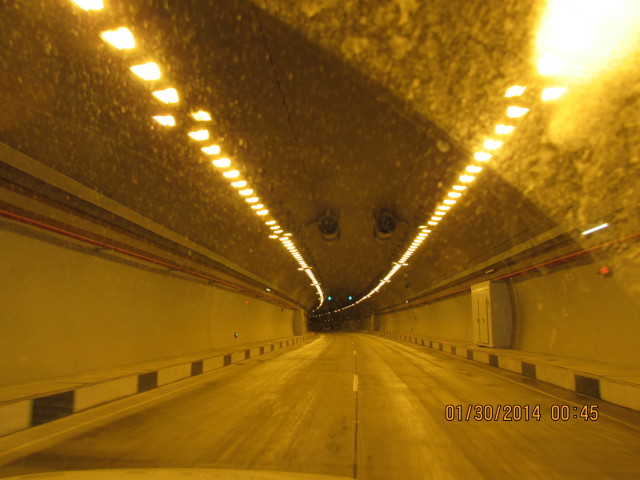
Russian Railways, which constructed the shiny new train line, and other construction companies, continue to use the Akshtyr quarry without a license. Numerous other illegal landfills, quarries and enormous piles of construction waste that are now just being dumped at roadside in the national park were also viewed by Bellona near the villages of Golitsino, Kamenka, Kleborob and on the road to Akshtyr.
By EWNC’s tally, there are some 1,500 illegal dumps abandoned in the protected lands surrounding Sochi. Self-combusting waste smolders within them.
This filth has run downhill into the Mzymta River as well as into underground water tables, filling it with toxins and chemicals that stand little chance of being cleansed or adequately compensated for. For instance, Russian Railways was fined a mere $3ooo for its illegal dumping at Akhshtyr, the AP reported.

As detailed by the EWNC report, swathes of the endangered boxwood tree species – in the Russian government’s own “Redbook” of plant and animal life under threat of extinction – were felled along the Mzymta’s banks.
Restitution is promised, but the slow-growing tress are unlikely to ever repopulate. The road and rail construction also endangers the rare Black Sea salmon population, which spawns in the river.
Ski jumps and ski runs were also built on about 6,000 acres of land carved out of the Sochi National Park. Ice rinks, roads and hotels were built on reclaimed marshland that had been a habitat for migrating birds, but are no longer.
Sochi residents who used to enjoy a dip in the Black Sea at the mouth of the Mzymta no longer do so – red splotches breaking out on their skin led them to conclude the water was no longer safe.
United Nations Environmental Program (UNEP) efforts to mitigate environmental damages, particularly to the Mzymta, have been largely pointless.
The report also details the extensive and corrupt procedures of swapping federally and regionally protected lands that made it possible to rewrite environmental law to redistrict national parks lands to regional governors who slated them as Olympic construction venues and dumps.
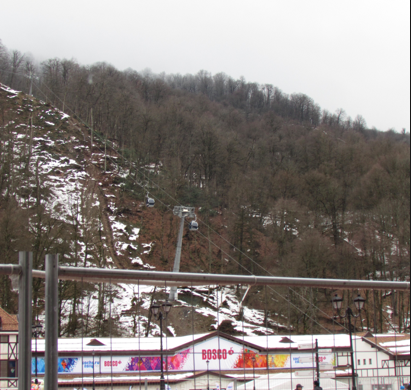
Meanwhile, that waste that is covered by the IOC’s Zero Waste policy is being trucked out of Sochi to a landfill 250 kilometers to the north in Belorechensk. The EWNC’s Dmitry Shevchenko says that’s an expensive cosmetic solution that will be abandoned as unsustainable when the games blow out of town.
Many media already in process of forgetting
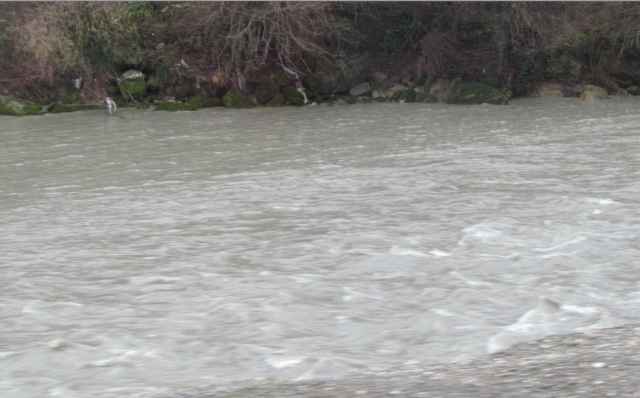
The receptionist who told the Chicago Tribune’s St. Clair that the water was dangerous wasn’t kidding. And despite – or maybe because of – her new rebirth as one of the spoiled Kardashian sisters, the biggest fear among environmentalists is that, come the end of the games, the construction waste will forgotten by the international media.
Indeed, St. Clair seems unwittingly to have summed up that sentiment with another of her blockbuster tweets yesterday: “Thrilled w/ all my new followers. But you guys may be a little sad when this is over & all I tweet about is Chicago crime & Real Housewives.”
“The Krasnodar Region, the Black Sea coast, the mountains, the national parks, the (Mzymta) River – this is all dead territory now,” EWNC’s Dmitry told me. “When the international community goes home, we will be left to struggle with this mess alone.”
Indeed. Back to American television, the whole of the Olympic devastation reduced to anecdotes about crappy water and toilets you’re not allowed to fish in.
Delays in presenting the report
EWNC has tried numerous times to bring the report to light on the eve of the Olympic opening ceremonies – a time when it would make an indelible impression. But that effort has been repeatedly been thwarted by interference of the Federal Security Service, or FSB – the KGB’s successor – as well as numerous arrests and petty police harassment of the EWNC’s most prominent activists. The police have, as Dmitry put it, created “a siege around our office.”
Dmitry and other activists told me they have holed up in their Kransnodar office because they are afraid that going out onto the street will result in their arrest.
But Dmitry’s fear is not so much for his own skin as it is for the successful release of the report, the near-final draft of which he has sent out to me and other journalists to assure that it sees the light of day if he is taken into custody under trumped up charges like so many of his colleagues.
Most prominently, those include Yevgeny Vitishko, one of the report’s main contributors, who was on February 2 incarcerated on accusations of swearing in public for 15 days. Or Igor Kharchenko, who was given a five day jail sentence for resisting police orders and roughed up by cops he himself called after three thugs – which EWNC caught on closed circuit TV – busted up his car and slashed its tires.
http://www.youtube.com/watch?v=F9cT-Uugyow
Another of the report’s authors, Suren Gazaryan, was granted political asylum in Estonia as threatened jail time over his environmental revelations snowballed in Russia.
He and Vitishko were given three year suspended sentences last year in a court in the Black Sea town of Tuapse for spray-painting on a construction fence surrounding the secret mountain hide-away of Krasnodar Regional Governor Alexander Tkachev, which was built on protected lands.
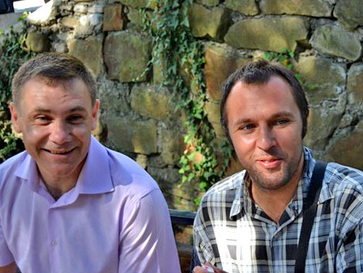
Neither of the men actually spray-painted anything on the fence. And the offending graffiti read “Tkachev is a thief” and “This is Our Forest.” Yet more absurdly, Vitishko told me, the fence itself, according to Krasnodar Regional forestry officials, does not even exist. Yes, you got that right: they were convicted for not spray painting on a fence that no documents show is there.
On December 21, the Tuapse court changed Vitishko’s suspended sentence to a custodial one, but he remained free on the condition he not leave the city until his appeal hearing, originally scheduled on February 22. After his 15-day jailing for “petty hooliganism” on Monday, however, the court moved his appeal hearing back to February 12.
As a result, EWNC’s Olga Soldatova told me via email, Vitishko will not even be able to attend his appeal hearing.
“It’s clear,” said Soldatova. “They intend to send Yevgeny straight to a prison colony without hearing his appeal.”
Yevgeny has been declared a prisoner of conscience by Amnesty International – the first of Russia’s Sochi show. But it is unclear what kind of resonance that will have in the future, as he serves out his penal colony sentence, his wife Lena, and two children at home.
Yevgeny told me in an interview when I met him in Tuapse last week that he is not afraid of going to jail.
“We’ve tried everything we can, given it all we have got, and I really doubt I am going to succeed with this appeal. I will be going to jail,” he told me as we strolled along Tuapse’s beachfront.
But he says that the roster of environmental abuses catalogued in their report make it all worth it.
“If going to a prison colony helps show the international community, or at least the International Olympic Committee, that they should give the Olympics to countries that can actually handle them responsibly, then I have succeeded in sending part of the message I want to send,” he told me.
By about 17:30 local time in Sochi, a little less than three hours shy of the 20:14 time set for the opening ceremonies to begin, @SochiProblems was still garnering about 50 new posts a minute, none of them in my quick review, devoting the slightest attention to the fact that much of the surrounding area has become an environmental wasteland.
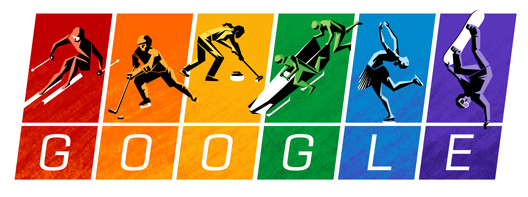
By and large, the tweets centered around admonishing the practice of last minute construction projects, and self-congratulation over being the funniest thread in the twitter universe.
It will be hoped that the Moscow release of the EWNC report will serve to dampen some of that laughter, and inject the sobering reality that nearly 10,000 hectares of some of the most pristine nature in the world have been destroyed in record times that will rival those sure to be set by many of the athletes at the Games.
Whatever is left over will be a problem for the Russian government to sort out – or not. The Russian Olympic slogan – “Hot. Wintery. Yours” – carries with it a subtext that offers some clues. Phrased another way, the slogan sums up Russia’s inherent contradictions, and gives them to the people to ferret out.
Its all yours Sochi, like it or not.
This is the tenth article in a series Bellona is producing on the Sochi Olympics.

Bellona held a seminar on countering Russian disinformation in the Arctic at the Arctic Frontiers international conference in Norway

Our December Nuclear Digest, reported by Bellona’s Environmental Transparency Center, is out now. Here’s a quick taste of three nuclear issues arisin...

Bellona has launched the Oslofjord Kelp Park, a pilot kelp cultivation facility outside Slemmestad, about 30 kilometers southwest of Oslo, aimed at r...

Our November Nuclear Digest by Bellona’s Environmental Transparency Center is out now. Here’s a quick taste of just three nuclear issues arising in U...